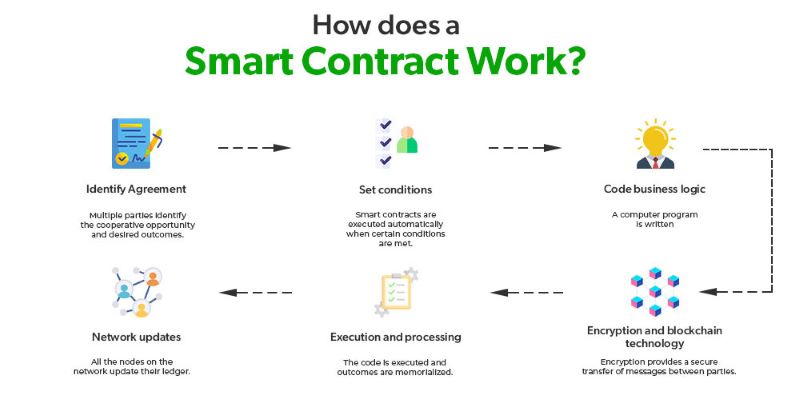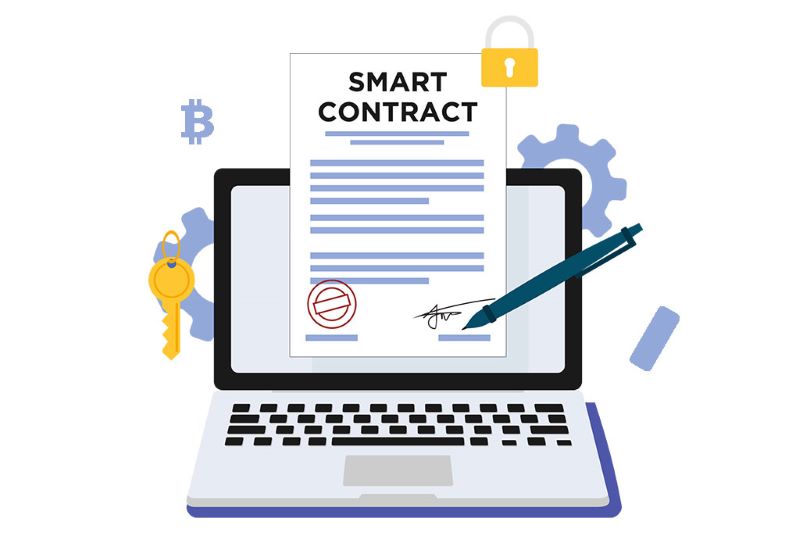Smart contracts are transforming industries, from finance to supply chain management. But what exactly are these self-executing agreements, and how do they leverage blockchain technology to create trust and transparency? Get ready to demystify the inner workings of smart contracts.
What are smart contracts?
Smart contracts are self-executing contracts with the terms of the agreement between buyer and seller directly written into lines of code. The code and the agreements contained therein exist across a distributed, decentralized blockchain network. The code controls the execution, and transactions are trackable and irreversible.
Traits of Smart Contracts
Transparency: Smart contracts are published to the blockchain, and can be read and written by anyone who has access to the blockchain.
Simplicity: Because smart contracts are expensive to deploy onto the blockchain and contain sensitive logic dictating the flow of financial transactions, they tend to be much smaller and simpler than most codebases.
Immutability: Once a smart contract has been deployed, it (typically) can’t be modified and is guaranteed to function identically no matter when its called! This allows smart contracts to operate as reliable, trusted third parties – because no individual controls the smart contract, it can act as a financial intermediary, a trustworthy automated market maker, or much more by guaranteeing impartiality.
How does the smart contracts work?
Smart contracts function as self-executing agreements with their terms directly embedded in code, existing on a decentralized blockchain network. This code governs the contract’s execution, ensuring transparency and immutability of transactions.

| Step | Description |
| 1. Creation & Coding | The terms of the agreement are precisely defined and translated into code using programming languages like Solidity (for Ethereum). |
| 2. Deployment on Blockchain | The compiled smart contract is deployed onto a blockchain network, where multiple nodes maintain identical copies, ensuring decentralization and security. |
| 3. Triggering Events | The smart contract’s code remains inactive until specific conditions outlined in the contract are met. These triggers can be payments, dates, or any agreed-upon event. |
| 4. Automatic Execution | When the predefined conditions are fulfilled, the smart contract automatically executes the agreed-upon actions, such as transferring funds or releasing goods. |
| 5. Immutable Record | All transactions and actions resulting from the smart contract’s execution are indelibly recorded on the blockchain, providing a transparent and tamper-proof history. |
Real-World Examples
Financial Instruments: Conventional financial transactions, like trading stocks or currencies, often necessitate third-party intermediaries like stockbrokers. Smart contracts can take on the role of this intermediary, enabling trades without requiring middlemen.
Property Ownership: In contrast to conventional legal documentation, smart contracts execute swiftly, offer public accessibility, and permit fractionalized ownership.
Token Creation: Remarkably, you can launch new token systems like Tether or Chainlink on Ethereum using smart contracts. Similarly, NFT projects like Bored Apes or CryptoPunks can be initiated through smart contracts.

What’s the difference between EOAs and Contract Accounts?
| Feature | EOA (Externally Owned Account) | Contract Account |
| Control Mechanism | Controlled by private keys associated with the account | Controlled by the code within the smart contract |
| Initiation of Actions | Can initiate transactions and interact with smart contracts | Cannot initiate actions on its own; responds to transactions received |
| Flexibility | Limited to basic transactions (sending/receiving tokens) | Can perform complex actions based on the code’s logic |
| Security | Vulnerable to private key theft or loss | More secure as code governs actions, but vulnerable to bugs in code |
| Creation | Created when a private key is generated | Created by deploying a smart contract on the blockchain |
| Examples | User wallets, exchange accounts | DeFi protocols, NFT marketplaces, decentralized applications (dApps) |
Understanding the distinction between EOAs and Contract Accounts is essential for anyone navigating the Ethereum ecosystem. While EOAs offer direct control and user-friendly interaction, Contract Accounts provide the flexibility and automation of smart contracts. By grasping their unique roles and functionalities, you can better understand the dynamics of the Ethereum network and harness its full potential for your decentralized applications and interactions.
Smart contracts are not just lines of code; they’re a paradigm shift in how we approach agreements. By automating processes, eliminating intermediaries, and ensuring transparency, they are poised to revolutionize industries and empower individuals. As blockchain technology continues to evolve, the potential for smart contracts is limitless.
Follow us at: Crypto Market Pulse


